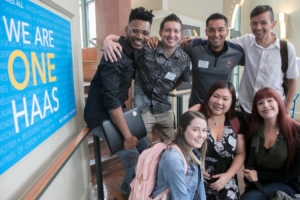For business majors these days, it’s hard not to hear about the hyper-aggressive recruiting in the banking, consulting, and accounting fields. For marketing majors, that rhetoric can get a little too loud — to the point of being almost deafening.
Annie Wang, a student at the University of California-Berkeley’s Haas School of Business concentrating in marketing puts it this way: “In my first year here, I think people have been like, ‘There’s more to business than just the ABCs — accounting, banking, and consulting.’”
Wang is a junior at Haas, which admits students into the undergraduate program after completing their second year at UC-Berkeley or a two-year junior college. “Haas is an amazing school, but very focused on the ABC fields,” Wang continues. “My first two years of college, I was kind of like ‘I’m not sure what I want to do or what marketing was. I just knew consulting and finance weren’t for me.”
‘AM I WASTING MY BUSINESS DEGREE IF I’M NOT PURSUING BANKING OR CONSULTING?’
Then the internal conflict started to kick in. “Am I weird because I don’t want to do consulting,” Wang questioned. “I thought, maybe I’m wasting my degree if I’m not pursuing a prestigious consulting firm.” Compounding these feelings, Wang says resources and information about marketing didn’t appear to be as readily available as they were for the other disciplines.
“For banking and consulting they say, ‘Here’s this forum, here’s another forum, and here’s another.’ All these consulting firms come to campus and everyone wants an investment banking internship,” Wang explains. “I think the business school has a lot of resources for marketing, but you have to go search for it yourself. It’s not that the resources aren’t there, but for marketing, you go seek out professionals you want to talk to and professors who have the advice.
“I would like to see the school be a little bit more supportive,” she continues. “It’s not that they aren’t, but there’s a certain prestige or idea of prestige surrounding banking and consulting, but not as much around marketing internships. I’d like to see emphasis on the importance of pursuing a career you really care about and you think is interesting. Also, I want to see more resources in terms of what the career salary looks like for marketing and if you can negotiate your offering. Right now, I’m not sure what an average starting salary would be or if I can negotiate it for higher. Other fields have a lot of that information easily available.”
MARKETING MAJORS SEEK MORE JOBS RESOURCES
Across the country, at the University of Virginia’s McIntire School of Commerce, business student Cindy Guo reflects on her own experience. It mirrors Wang’s in that the prestige of banking and finance fields leaves marketing students feeling somewhat left in the shadows.
“I would especially see it in my non-marketing classes,” Guo who is a senior concentrating in marketing, says. “Most people are going into those fields so a lot of those times the professors gear lectures toward them.”
Likewise, another East Coast student — Ernie Gomez at the University of Maryland Smith School of Business — sees it the same way as Wang and Guo. “I would appreciate it if the school brought in marketing firms in the College Park area that only focus on marketing research and design and they only hire marketing majors,” Gomez, who is a senior marketing major tells P&Q. “If they bring those individuals, students can then start to figure out where they want to go in marketing. A lot of people are still struggling on what the major actually is, what’s our major’s purpose, and knowing what fields we can get into.”
Finally, Virginia’s Cindy Guo says it’s also true that not being a finance or accounting major puts students at a slight disadvantage when it comes to finding internship and job opportunities. For instance, “I think a lot of students look for jobs and internship opportunities on Handshake as their first step a lot of time,” she says. Handshake is a job posting platform used by many B-schools and institutions. Says Guo, “I remember not being able to find marketing opportunities there. It was all filled with finance and accounting and IT postings. I would have appreciated more marketing postings just so I have something on Handshake to look at.”
KEEP CALM AND IGNORE THE HOOPLA
For business schools and the administrators within, all of this amounts to a big dilemma.
“At UVA, we’ve long been aware that marketing students may perceive they’re not as important within career services and to employers because, traditionally, those who are recruiting marketing students don’t have a strong presence on the ground or are not recruiting as actively,” says Denise Egan, assistant dean for Commerce Career Services. “Marketing hiring doesn’t happen in bulk like it does with maybe finance and accounting. There isn’t that big of a recruiting push or, quite frankly, the hoopla that comes with it.”
It’s the hoopla that can cause anxiety among students in other majors.
“In January, most people in marketing hadn’t really started interviewing yet because it happens in the spring,” Guo says. “A major point of anxiety is that finance and accounting students already have jobs secured and knew before the start of semester. They had internships at bigs that would give them offers. That wasn’t my experience. I interned at a media agency last summer, but that’s not how these companies work. Once your internship is over, you have to restart your search and redo the process all over again to find a full-time job.”
Egan empathizes with students in this regard.
“I think the biggest challenge is easing our students anxieties about this,” she says. “Because the timeline for opportunities in certain sectors is indeed later than others. It’s challenging when students are seeing their peers get scooped up by companies early and talking about where they’re going or no longer having to worry about recruiting. Our challenge is to work with them and provide customized advising support to let them know ultimately it will work out.”













Questions about this article? Email us or leave a comment below.